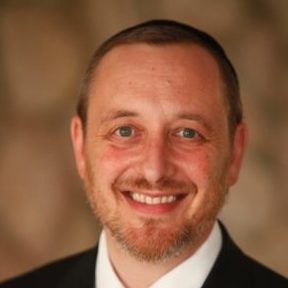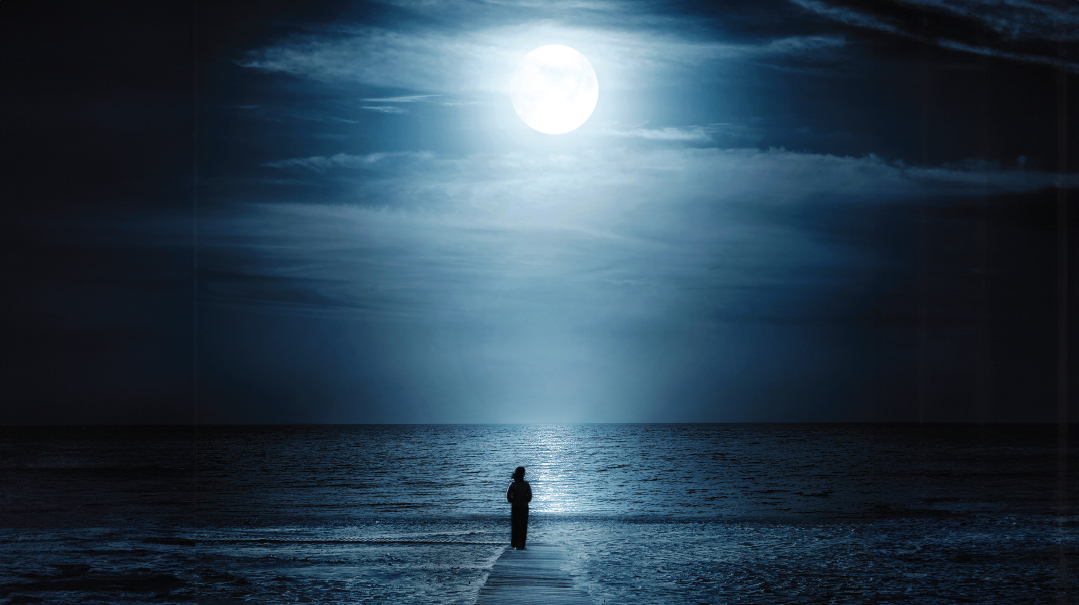The Crucial Question

Rav Moshe Shapira on Rosh Hashanah
O
n Rosh Hashanah, Hashem sets the reset button on Creation.
On the last day of Elul, as the sky is painted in shades of fiery red, the sun plunges over the horizon one last time. It disappears into darkness and the world dies. The chazzan solemnly chants Borchu as a new world is created.
Every Shabbos we revisit the Shabbos of Creation and taste the future Shabbos of Olam Haba. Every Leil HaSeder we once again come out of Egypt, and every Shavuos we return to Har Sinai. On Rosh Hashanah we go back to “Zeh hayom techilas ma’asecha,” the moment when it all began.
Hashem challenges the angels, “Naaseh adam — shall we create man?” (Bereishis 1:26) The debate begins (see Bereishis Rabbah 8:5). Our existence hangs in the balance. As the Mishnah relates (Rosh Hashanah 1:2) everyone passes in front of Hashem, like sheep being counted. As a unique individual, each one of us receives Hashem’s full focus and attention. This is both terrifying and elevating. Each one of us becomes Adam Harishon at the moment of creation. Hashem turns to the angels and repeats the question: Shall we recreate this person?
We are given 48 hours to justify our right to life.
What approach will best guarantee our survival?
Important note: As with everything I write from what I gleaned from the Torah of my Rebbi, it is based on my understanding and written in my style, and most certainly does not convey the full depths of what he wanted to teach on the subject. I’d like to thank the family of Rav Moshe Shapira for approving the dissemination of his Torah in this format.
A WORLD IN BALANCE
The Rambam (Hilchos Teshuvah 3:1) introduces the judgment of Rosh Hashanah in the following way:
"Everyone has zechusim (merits) and avonos (sins). If you have more merits than sins, you are a tzaddik. If you have more sins than merits, you are a rasha. If your merits and sins are equally balanced, you are a beinoni. Similarly, if the inhabitants of your nation have more merits than sins it is a righteous nation. If the inhabitants have more sins it is an evil nation. And the same applies to the whole world."
The Rambam continues and explains that the rasha must die immediately and the evil nation must be destroyed. Furthermore, only the “Kel Dei’os”, the All-Wise G-d, can possibly assess the worth and value of our actions.
There are fundamental questions on this Rambam.
- The Raavad wonders about the veracity of the statement “The rasha must die immediately.” How can this be true? We see plenty of evil people who live long and happy lives!
- How can a person be judged by the majority of his actions? Does the minority just get ignored? As the Rambam himself teaches us, the bedrock of our belief in schar v’onesh (reward and punishment) is that we are accountable for even our smallest actions.
- What is the significance of weighing our merits against our sins? What is the purpose of scales? And crucially, what is the relevance being labeled “tzaddik,” “rasha,” or “beinoni”? Why isn’t a simple and logical method of judgement sufficient? When we were children, didn’t our parents teach us that we get reward for every mitzvah and the opposite for every sin? Who needs labels?
Apparently, on Rosh Hashanah, labels are everything.
THE PROMISE THAT PRECEDES LIFE
The Talmud [Niddah 30b] describes in great detail what life is like in utero. Before you are allowed to leave your mother’s womb, an angel forces you to take an oath. The angel demands that you swear, Tehi tzaddik v’al tehi rasha! Be a tzaddik and do not be a rasha! You take the oath and moments later you enter this world. Mazel Tov! A child is born. Let life begin.
This oath is puzzling. At Har Sinai, every Jew made an oath to keep all the mitzvos (see Nedarim 8a). If this is the case, what’s the purpose of the second oath that we make at birth? On a technical level, there’s a halachic principle that an oath cannot stand on a pre-existing oath, which means the oath you made at birth is invalid!
Let us unravel this mystery by observing the actions of a wise king. He may require two sets of commitments from his citizens. The first is to observe the laws of his realm. There are standardized laws about everything from paying taxes to the speed limits on the highways. Laws determine what happens in emergencies — war or famine. Everyone follows the same decrees.
But the king does not just want a country of rules. He wants to bring his kingdom to its full potential. So he decrees that each citizen stand in front of him as an individual. Each person is told, based on his unique qualities, what he needs to do to affect the destiny of his realm. One should enter the army; another should use his acumen to be a financial advisor. Another needs to sweep the streets.
Similarly, Hashem requires that every Jew make two separate oaths. The first we made at Har Sinai, when we collectively committed ourselves to a life of Torah and mitzvos. The second oath is made at birth. In it, each individual commits to “being a tzaddik.” Tzaddik comes from the word tzedek, justice, meaning that each person must justify his existence.
The oath “to be a tzaddik” is a promise each of us makes to fulfill our unique mission on earth.
BACK TO THE GARDEN
When Adam and Chava were created, they were placed in the Garden of Eden and given a unique mission. Every Rosh Hashanah we return, like a newborn baby, to that moment of birth. On the deepest level, we return to the Garden and are once again charged with a mission. Except this time, we come as individuals with a mission uniquely ours.
Hashem turns to the Heavenly retinue and asks, Shall we recreate this person? Is he up to the challenge? Is he ready to bring out My big plan of bringing the world to perfection? Is he worth the investment?
That is what the Rambam means when he says that we are judged on whether we have earned the label tzaddik. Of course we are held accountable for each and every one of our actions. But that is not the judgment of Rosh Hashanah. That’s an ongoing judgment throughout the year. On Yom Hadin, however, Hashem wants to know if we can justify our existence.
The concept of “the majority of our actions” means that our mitzvos are the actions that define me. My “minority actions” are irrelevant. We may not be perfect, but we know that bringing out our part in perfecting the world is central to our existence. We want to be the best soldier we can be in Hashem’s army. We dream of being the best musician in His orchestra.
We live in the mindset of the tzaddik.
Furthermore, the Rambam teaches us that we should see our Rosh Hashanah judgment in the context of our nation and the whole world. Possibly, the Rambam is teaching us that we must see our choice of living the life we were created for as a responsibility that has ripples throughout the universe. As if to say, “The whole world is hanging in balance and is waiting for me to anchor it into Hashem’s plan.”
Hashem, in turn, writes us down in the Book of Life. This does not mean we will be granted life on a physical level. It means we’re part of His plan to bring out perfection in creation. We are part of Hashem’s reality. In the World to Come we will live forever with Hashem. That is the ultimate expression of life.
We can now answer the Raavad’s question. The statement “The rasha must die immediately” is the cruelest form of death. The Book of Death may grant him a long life, surrounded with wealth and family and enjoying all the physical delights of this world. But he is outside of Hashem’s reality. He is living like a zombie in a parallel universe. For the minority of good deeds he may have done he receives his reward. But when his body is placed in the ground, he is left with nothing. He is denied a perfect world that is truly forever. His life is the ultimate expression of death.
What is our best approach for survival?
For 48 hours we need do everything we can to imitate Adam and Chava in the Garden of Eden. Hashem created us b’tzelem Elokim, in His own image. He gave us dominion over His creations on earth. We must act dignified, dress in Yom Tov clothing, and enjoy “the fruits of the Garden” at our Yom Tov table. But in our hearts and tefillos we are focused on one thing:
I want nothing more than to bring out Hashem’s Malchus (realm). I want to be the best person I can be so that I can serve Him to the best of my ability.
The corollary of our avodah on Rosh Hashanah is that we do not mention our sins. There is no confession on Rosh Hashanah. Hashem judges us “ba’asher hu sham,” the way He sees us as we stand in front of Him. We will deal with our past on Yom Kippur, the Day of Rachamim (mercy). Like posing in front of a camera on our wedding day, now is the time to look our best. We need to believe in our ability to bring out our mission. Yet this is coupled with extreme humility, as we stand in front of our King of Kings.
In Real Life
Days of Trembling
It was astounding to watch Rav Moshe in the month of Elul. His awe of the Yom Hadin was palpable. He referred to Elul as “the gift from Rav Yisrael Salanter,” a reference to how the mussar giant sensitized us to treat Elul as a month completely focused on preparing for the Yamim Noraim. In his younger years, Rav Moshe once stayed up every night throughout Elul learning b’chavrusa with Rav Yitzchok Hutner ztz”l!
One Friday morning in Elul after a trip to America he came straight from the airport to give us shiur in Bayit Vegan. Afterward, he had an unusual request. Could I ask my son, who lives in Bayit Vegan, to arrange for him to hear shofar? The minhag of hearing shofar after davening, although not required by halachah, was something Rav Moshe was not prepared to forfeit.
Shofar was a perfect example of Rav Moshe’s remarkable meticulous care in mitzvah observance. For years he davened at the Chanichei Yeshivos haneitz minyan in Bayit Vegan. Rav Tzvi Levi, mashgiach at Yeshivas Kol Yaakov, was the baal tokeia. But he didn’t actually daven Mussaf with the minyan. After the final shofar blast Rav Levi would go to his yeshivah and blow for them as well before joining them for Mussaf.
Rav Levi relates that when Rav Moshe found out this fact he was not happy. He was concerned about the minority opinion of the Gaonim that requires the baal tokeia to daven Mussaf with the same minyan where he is blowing shofar. Rav Levi respectfully acceded to Rav Moshe’s request that he daven with them.
Rav Moshe had his own special shofar. Today, it’s assumed that every shofar has had its shape altered through heat to make it easier to blow. Rav Moshe’s shofar remained pristine, straight from the head of a ram, once again following a minority opinion (see Pischei Teshuvah O.C 586:1). And yes, it is harder to blow! Before his last Rosh Hashanah, when he was recuperating from surgery in New York, Reb Moshe’s family went to great lengths to make sure he had his beloved shofar brought from Eretz Yisrael.
Of course it was Rav Moshe’s dikduk b’mitzvos bein adam l’chaveiro, his deep love for every Jew, that always stood out.
On Erev Rosh Hashanah, Rav Moshe would teach a packed audience at Yeshivas HaRan in Ramot, preparing them for the Day of Judgment. Year after year, when the shiur was over, he would disappear in the direction of Ramat Polin. Where was he going during those precious moments before Yom Hadin?
He was visiting the home of a widow whose husband, one of Rav Moshe’s talmidim, had tragically died young. For Rav Moshe, it was important that the almanah and her children received brachos for the New Year.
Which world?
Rav Moshe frequently referred to the “harsh judgment” of a rasha who receives his reward in this world so he can be destroyed after death. As we explained, this is the frightening expression of “Reshaim afilu b’chayeihem nikraim meisim — Even when the evil are alive they are called dead.”
Rav Moshe was fond of teaching this idea by relating a poignant story from the Rebbe of Kotzk.
When the Kotzker Rebbe was young he had to travel long distances to visit his rebbe. Unable to afford transport, he used to go for days by foot. Sometimes he would hitch a ride from place to place. One day he was fortunate to get a ride in a luxurious carriage. The wealthy owner was none other than a childhood friend who had abandoned observance.
The rich man reminded the Kotzker how they used to argue about the value of the pleasures of Olam Hazeh. He asked the Kotzker to come on a tour of his beautiful mansion so that he could see for himself the benefits of affluence. The Kotzker agreed and was shown through opulent rooms and gardens. To the bewilderment of his host, the Kotzker remind silent throughout.
Eventually the rich man turned to the Kotzker and said, “Surely you are impressed with what you see?”
The Kotzker gave a mortifying response. He said, “There is no question that what you have shown me is stunning. But there’s something I don’t understand. You said you would show me your Olam Hazeh. Yet all you have shown me is your Olam Haba…”
As the story goes, the rich man internalized the lesson and did a full teshuvah.
Getting Personal
Rav Moshe would frequently mention that the original tefillos of Rosh Hashanah did not even include a request for life. A true servant does not ask for anything for himself. He only exists for the King. In the times of the Gaonim, the phrase zochreinu l’chayim (remember us for life) and similar additions were added. As the generations become weaker, the tension of the day became too overwhelming. We needed to ask for life. The stirring words of Unesaneh Tokef, totally self-focused, were only added in the 11th century.
I shared with Rav Moshe what I teach my students. My suggestion was that they write up their personal needs before Rosh Hashanah. Refuah, shidduchim, parnassah, shalom bayis, and so on. Then, before they take their three steps backward at the end of each Shemoneh Esrei, they should take out their lists and ask Hashem for what is truly burdening their hearts.
But here is a crucial caveat: The request must be made with true sincerity, in the language of a soldier asking for his needs. “Hashem! How can I fight Your battles if I am stressed with — (fill in the blank).” Your needs must be His needs. On Rosh Hashanah we can all find the ability to say this genuinely from our hearts.
Although Rav Moshe never told us to do this, he gave his approval to what I was teaching.
Originally featured in Family First, Issue 608. Rabbi Menachem Nissel is a mechanech in Jerusalem and is the author of Rigshei Lev: Women & Tefillah. He is a talmid of Rav Moshe Shapira ztz”l)
Oops! We could not locate your form.





